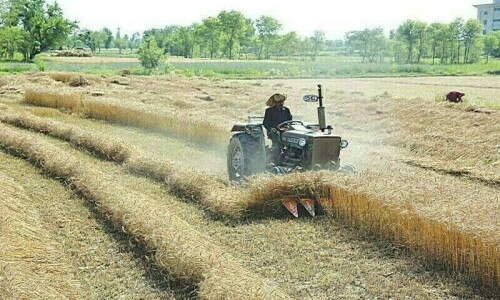IT is an anomaly that a nation which was united in its efforts to provide succour to the victims of the devastating earthquake of 2005 and the floods that destroyed homes across the country some years later should now disregard the plight of the IDPs from North Waziristan.
There could be several reasons for this change of heart — from biased perceptions of the tribespeople to donor fatigue to a feeling that the refugee crisis is a man-made one and hence an issue that the politicians and military must deal with.
But that does not explain why governments too should be reluctant to address the IDPs’ needs, such as the Sindh government which initially said the refugees would not be allowed in the province — a stance echoed by some Sindhi nationalist parties.
Success of operation linked to IDPs’ help
It is in this context that we should heed what Federal Minister for States and Frontier Regions Abdul Qadir Baloch said in Islamabad on Tuesday.
The retired lieutenant-general, who is well aware of the dimensions of the challenge to bring relief to the IDPs, warned that the operation could fail if the refugees were not taken care of properly. Eliminating the militants, he said, was less of a problem than providing adequate relief to the nearly one million men, women and children who have been displaced by the fighting and are living in camps, dependent on daily supplies for survival.
Even if they are well taken care of, they will continue to be haunted by the trauma of the flight from their ancestral homes not knowing how long they will have to dwell in the camps as hapless refugees in their own country.
Mr Baloch was also right in raising concern about how the IDPs will fare once Operation Zarb-i-Azb is over and they return home. Will North Waziristan then be habitable, or will the IDPs return to find it in ruins? In other words, will the state succeed in making arrangements well in time to ensure their rehabilitation and smooth return to normal life, and in a manner that the tribesmen do not have to fear the return of the militants? These questions are vital especially when those displaced by the South Waziristan operation have yet to be rehabilitated.
Undeniably, the IDPs’ tragedy has also resulted in social pressures for the rest of the people who find they must now share their land and resources with them, the constitutional right of the IDPs to reside anywhere in the country notwithstanding.
Nevertheless, with most of the IDPs confined to the Bannu camps, it is time the country shouldered the responsibility expected of it. Besides being given relief goods, the IDPs must be made to feel that the nation is with them. For its part, the federal government should launch a campaign that could mobilise and tap the Pakistani people’s philanthropic generosity.
Published in Dawn, July 24th, 2014













































